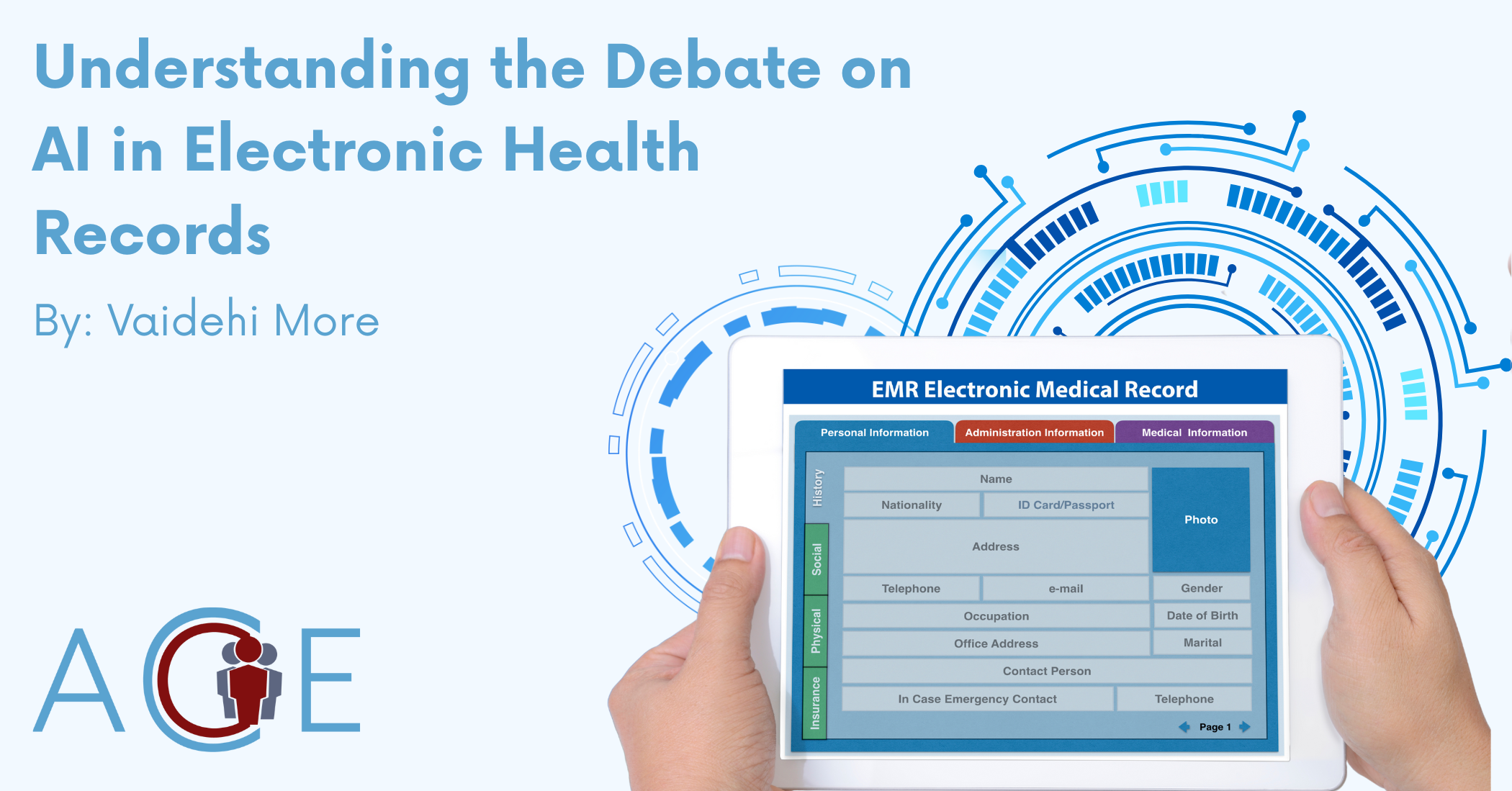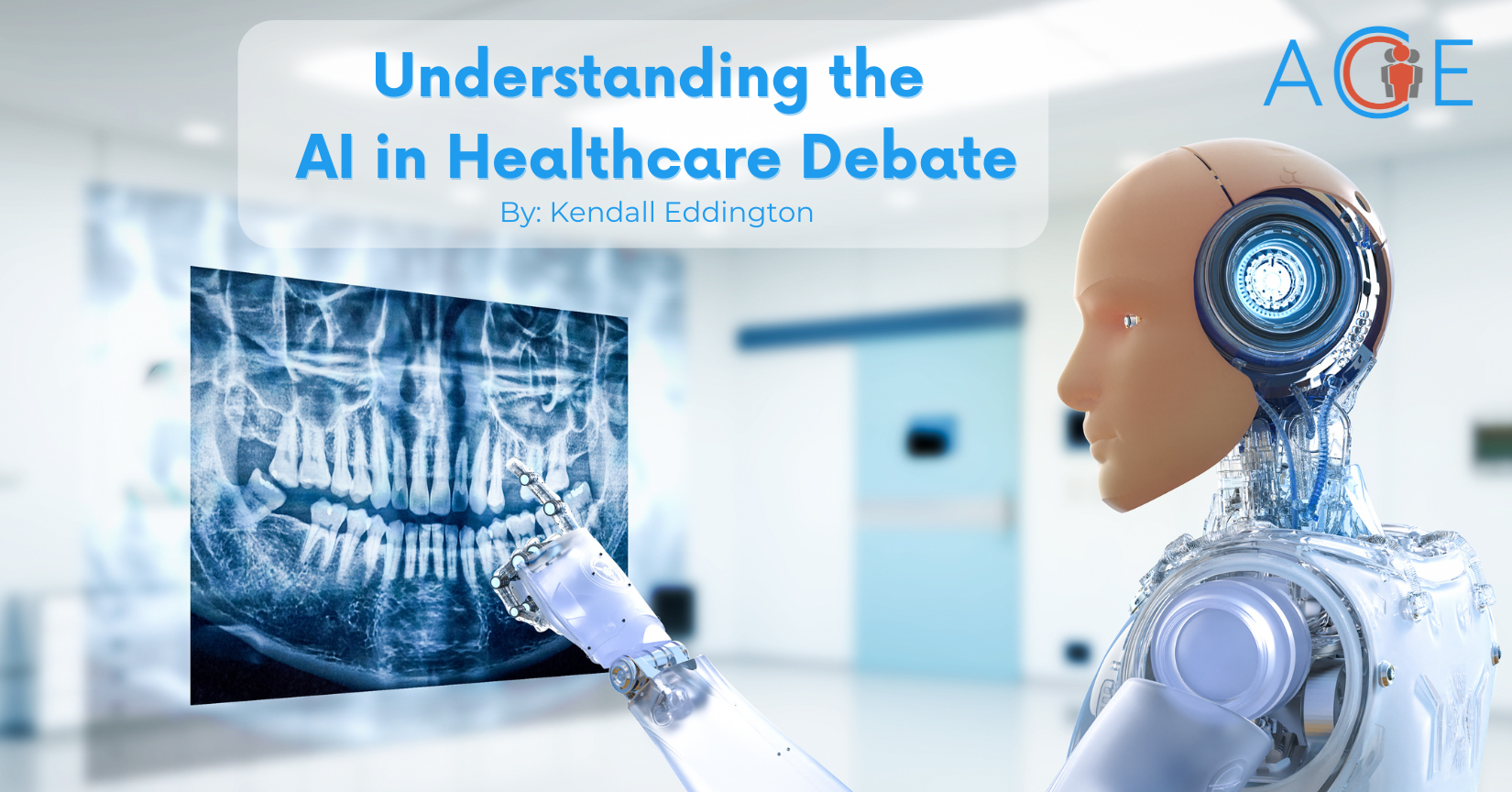Background
Artificial Intelligence (AI) refers to the use of computer algorithms to process data and make decisions, ultimately streamlining administrative processes. In healthcare, AI is being increasingly integrated with Electronic Health Records (EHRs)—digital systems that store and manage patient health information, such as medical history and diagnoses. By 2021, almost 80% of office-based physicians and virtually all non-federal acute care hospitals had implemented an EHR system. As part of this widespread adoption, various AI applications in EHRs are beginning to emerge. So far, the main functions of AI in EHRs include managing datasets of patient health information, identifying patterns in health data, and using these patterns to predict health outcomes and recommend pathways for treatment.
Arguments in Favor of AI in EHRs
The use of AI in EHRs presents opportunities to improve healthcare by increasing efficiency as well as supplying administrative support. Supporters of AI integration argue that it can significantly improve diagnostic accuracy. AI-integrated EHR systems can analyze vast amounts of patient data, flagging potential issues that might otherwise be overlooked by human clinicians. Machine learning algorithms can identify patterns across multiple cases and recommend diagnoses or treatments based on evidence from similar cases. Proponents contend that by reducing human error and providing real-time insights, AI could support doctors in making more accurate and quick decisions, leading to better patient outcomes.
Proponents of AI in EHRs also argue that AI has the potential to significantly reduce healthcare inequities by providing better access and more personalized care for underserved populations. AI-powered tools can identify at-risk patients early by analyzing complex data, including demographic and behavioral factors, and help prioritize interventions for those who need it most. Additionally, AI can bridge communication gaps for patients facing language barriers or low health literacy, ensuring they receive clear and relevant information about their health. Supporters also suggest that AI’s ability to reduce human biases in clinical decision-making, such as disparities in pain assessment or treatment recommendations, could lead to fairer, more equitable healthcare outcomes for all.
From the workforce perspective, supporters argue that AI integration in EHRs has the ability to significantly reduce physician burnout by streamlining the documentation process. With the increasing time spent on EHR tasks, AI-driven tools like voice-to-text transcription, automated note generation, and data entry can cut down the time physicians devote to administrative duties. For instance, one 2023 study reported that AI integration in health records led to a 72% reduction in documentation time, equating to approximately 3.3 hours saved per week per clinician. This allows doctors to spend more time on direct patient care and less on paperwork, which supporters contend will improve job satisfaction and reduce stress.
Arguments Against AI in EHRs
While some argue that AI in EHRs will lead to more accurate and equitable healthcare, others raise concerns regarding data bias, privacy, and transparency. Critics of AI integration argue that modern legal frameworks lack adequate safeguards for individuals’ health data, leaving sensitive information vulnerable to breaches. For example, data collected by AI tools may be hacked or gathered without consent for marketing purposes. Additionally, certain genetics testing companies that operate without sufficient legal oversight may sell customer data to pharmaceutical and biotechnology companies.
Moreover, some critics share concerns about whether AI integration in EHRs aligns with standards for informed consent. Informed consent is a key ethical principle that ensures patients are fully informed and in control of decisions regarding their healthcare. It includes elements such as the patient’s ability to understand and make decisions about their diagnoses, treatment options, and any risks involved. Ethical responsibility dictates that consent should be specific, voluntary, and clear. The rise of AI in healthcare applications has increased concerns about whether patients are fully aware of how their data is used, the risks of procedures, and potential errors in AI-driven treatments. Autonomy principles state that patients have the right to be informed about their treatment process, the privacy of their data, and the potential risks of AI-related procedures, such as errors in programming. Critics say that patients must be more informed about how AI is integrated into health records systems in order for them to truly provide informed consent.
Another significant ethical concern in the use of AI and machine learning (ML) in healthcare is algorithmic bias, which can manifest in racial, gender, and socioeconomic disparities due to flaws in algorithm design. Such biases may lead to misdiagnosis or delayed treatments for underrepresented groups and exacerbate inequities in access to care. To address this, advocates push for the prioritization of diverse training data that reflects demographic factors. They hold that regular evaluations are necessary to ensure that AI models consistently remain fair over time, upholding the principles of justice and equity.
Future Outlook
Building on the potential of AI in healthcare, H.R. 238, introduced on January 7, 2025, proposes that AI systems be authorized to prescribe medications if they are approved by the Food and Drug Administration (FDA) and if the state where they operate permits their use for prescribing. This bill represents a significant step in integrating AI into clinical practices, going beyond data management to reshape how medications are prescribed and managed. The arguments for and against H.R. 238 mirror the debate around AI integration in EHRs; while proponents of the bill argue that AI could enhance patient safety, reduce errors, and alleviate clinician burnout, critics highlight concerns regarding the loss of human judgment, data privacy, and the potential for AI to reinforce biases in healthcare. As AI continues to play a central role in healthcare, bills like H.R. 238 spark important discussions about AI’s ethical, practical, and legal implications in clinical decision-making.
Summary
In conclusion, the integration of AI into EHRs has forced medical stakeholders to balance a need for improvements in accuracy and efficiency with a concern for medical ethics and patient privacy. On one hand, AI can support more accurate diagnoses, enhance patient care, and help reduce the burnout faced by healthcare providers. Additionally, AI may contribute to reducing healthcare inequities by providing better access and more personalized care, especially for underserved populations. However, the implementation of AI also raises concerns regarding data privacy, algorithmic bias, and informed consent, suggesting a need for more careful implementation and oversight. As AI’s presence in healthcare settings continues to expand, addressing these concerns will be key to ensuring it benefits patients and healthcare providers alike.

